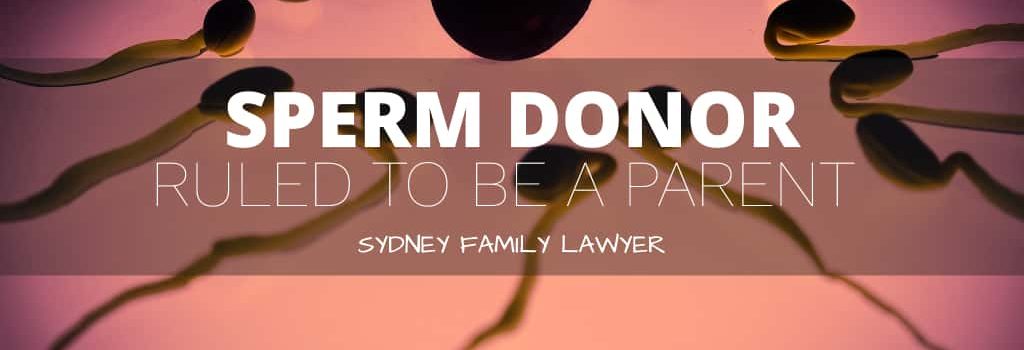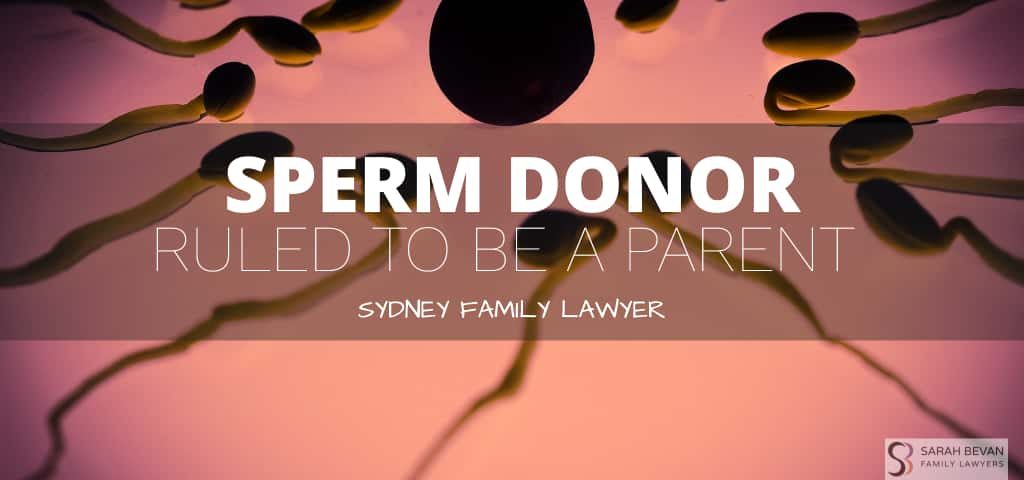- Sydney Family Lawyers
- (02) 9633 1088
- mail@sbfamilylawyers.com.au
Sperm Donor ruled to be a Parent
New High Court decision alert: Sperm donor ruled to be a parent
Masson & Parsons & Ors [2019] HCA 21
On 19 June 2019, the High Court of Australia (HCA) handed down a unanimous decision to allow an appeal of a judgement of the Full Court of the Family Court of Australia in relation to parenting orders made under Part VII of the Family Law Act 1975. If you missed this decision, continue reading for a brief summary of the facts of the case and reasons for judgment.
In 2006 the man, Mr Masson, and his then friend Ms Parsons agreed to use artificial insemination for Ms Parsons to conceive a child. Mr Masson’s understanding was that once the child was born, he would be involved in the child’s life.
At the time of the child’s birth, the appellant’s name was entered onto her birth certificate. After the child was born, Ms Parsons commenced a de facto relationship with Ms P, another woman. The child lived with the couple and they were both considered her mother, but Mr Masson was closely involved with the child.
In 2015, the mothers planned to move, along with the child, to New Zealand. Mr Masson applied to the Family Court of Australia seeking orders for parental responsibility and orders preventing the mothers from leaving Australia with the child. There were then 3 Court decisions.
First decision – Family Court:
Justice Cleary of the Family Court determined that the Family Law Act sets out that a man who provides semen for the purposes of artificial insemination is presumed not to be the father of the child born as a result of that procedure. However, she also said that the provisions in the Act were not an exhaustive list of the types of people who could be considered parents and because the appellant was considered a parent within the ordinary English meaning of the word, he was a parent of the child for the purposes of the Family Law Act.
Second decision – Full Court of the Family Court:
The mothers appealed to the Full Court of the Family Court. The Full Court agreed with Justice Cleary that the provisions were not exhaustive and expanded on who could be considered a parent. However, they did not agree with her conclusion that Mr Masson was considered a parent of the child. The Full Court looked at the Judiciary Act 1903 (Commonwealth legislation) and determined that it picked up sections of the Status of Children Act 1996 (NSW legislation). In this analysis of the legislation, it was concluded that there was an irrebuttable presumption that the appellant was not a parent of the child.
Third decision – High Court of Australia:
Once the case reached the High Court, it was unanimously agreed that the determination made by the Full Court regarding the application of the Judiciary Act and the Status of Children Act to the case was not correct, but rather the determination of Justice Cleary was. The High Court said at paragraph 39 of its decision that the provisions in the Status of Children Act were a “conditional rule of law determinative of the parental status of the persons to whom it applies which operated independently of anything done by a court or tribunal”, meaning that the provisions are not picked up by the Judiciary Act as the respondents had argued in the Full Court.
The High Court also said that Mr Masson was correct in arguing that the provisions in the Status of Children Act could not be picked up by the Judiciary Act because the Family Law Act had “otherwise provided”.
The High Court noted that Part VII of the Family Law Act proceeded on the premise that the word “parent” retained its ordinary English meaning, and agreed with both Justice Cleary and the Full Court that the list of people who could be considered parents set out in the provisions of the Family Law Act was not exhaustive.
The High Court rejected the argument by the mothers that the ordinary English meaning of the word “parent” excluded a “sperm donor” because the appellant, in this case, was much more than just a “sperm donor”, but someone who was very involved in the child’s life, even known to her as “dad”.
It was concluded in paragraph 55 of the decision that “no reason has been shown to doubt the primary judge’s conclusion that the appellant (Mr Masson) is a parent of his daughter”.
Every family law case is unique given every family’s individual circumstances. Most sperm donors do not have any involvement in the lives of children born as a result of their donation. But there are numerous known sperm donors who have varying degrees of involvement in the children’s lives.
This case revolves around a sperm donor who was very closely involved in the child’s life, and so the decision may well have been different if he was only involved to a much lesser degree.
If you have any questions about artificial insemination and parenting rights/responsibilities, get in contact with Sarah Bevan Family Lawyers.
Case Study was written by a Family Lawyer at Sarah Bevan Family Lawyers.



